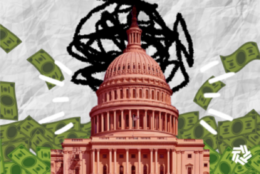Danny Werfel
-
New proposed guidance from the Office of Management and Budget would streamline and consolidate grant regulations for every agency. Comments on the recommendations are due May 2.
February 04, 2013 -
At the National Council on Federal Labor-Management Relations meeting, several employee representatives said the time has come for the committee to put more pressure on agencies to have more of the collaborative forums up and running well. During a time of budget reductions, possible furloughs and a government shutdown, the unions say the forums provide a way for agencies to better manage all of these fiscal challenges.
January 17, 2013 -
The Obama administration offered agencies new guidance on sequestration, telling agency leaders and federal-employee unions that sequestration won't have an immediate impact on the federal workforce or government operations even if the automatic budget cuts go into effect Jan. 2.
December 20, 2012 -
NASA, the Surface Transportation Board and the Federal Deposit Insurance Corporation share a common trait that led them to the top ranking for their size class in the Partnership for Public Service's seventh annual Best Places to Work survey. Transportation, OMB and the National Credit Union Administration earn the most improved status by implementing the best practices of the leading agencies.
December 14, 2012 -
OMB Controller Danny Werfel explains how agencies have been able to cut improper payments. Also, the VA's Mary Santiago discusses the hurdles to hiring more veterans into the federal workforce.
November 29, 2012 -
OMB Controller Danny Werfel announced Wednesday the federal government avoided paying out $47 billion in overpayments over the last three years. This missed President Barack Obama's goal of reducing improper payments by $50 billion by the end of FY2012.
November 23, 2012 -
Agencies will be liable for many of the costs coming from the termination of contracts, including legal fees and employee compensation costs, if sequestration happens Jan. 2, 2013 and if vendors do not issue layoff notices this fall.
September 28, 2012 -
Mr. Werfel is responsible coordinating OMB's efforts to initiate government-wide improvements in all areas of financial management.
September 27, 2012 -
Over the last three years, agencies understood the problem better, improved how they tracked the information and used advanced data analysis tools to lower the governmentwide rate to 4.69 percent from 5.42 percent in 2009. While the amount of money improperly paid out hit a high of $125 billion in 2010, Danny Werfel, the Office of Management and Budget's controller, expects it to drop for a second consecutive year, below the $115 billion mark in 2011.
September 04, 2012 -
Mr. Werfel is responsible coordinating OMB's efforts to initiate government-wide improvements in all areas of financial management.
July 13, 2012 -
In its second report to the President, the Government Accountability and Transparency Board updates progress on several pilots to implement three broad-based recommendations. DoD and HHS are reviewing how best to standardize spending data. OMB is developing a Statement of Spending to provide more transparency into how agencies spend their funds.
July 10, 2012 -
The administration will kick off the 2012 program to find money-saving ideas in a few weeks. Agencies will get to vote on a final list of ideas in the next few months.
July 02, 2012 -
Agency officials from the Defense Department and the Office of Personnel Management, along with a handful of other agencies, cited significant improvements in both timeliness and accuracy in the security-clearance program at a Senate subcommittee. The agencies agreed, however, much work remained to maintain that progress and to take on new challenges, such as reciprocity and reinvestigation.
June 21, 2012 -
The administration has set steep goals in slashing the number of excess federal properties and the costs associated with operating them. But the main resource for tracking federal properties is plagued by unsound data collection efforts, inconsistent standards and inaccuracies, according to a new Government Accountability Office review.
June 20, 2012 -
On the In Depth show blog, you can listen to the interviews, find more information about the guests on the show each day and links to additional resources.
June 06, 2012




